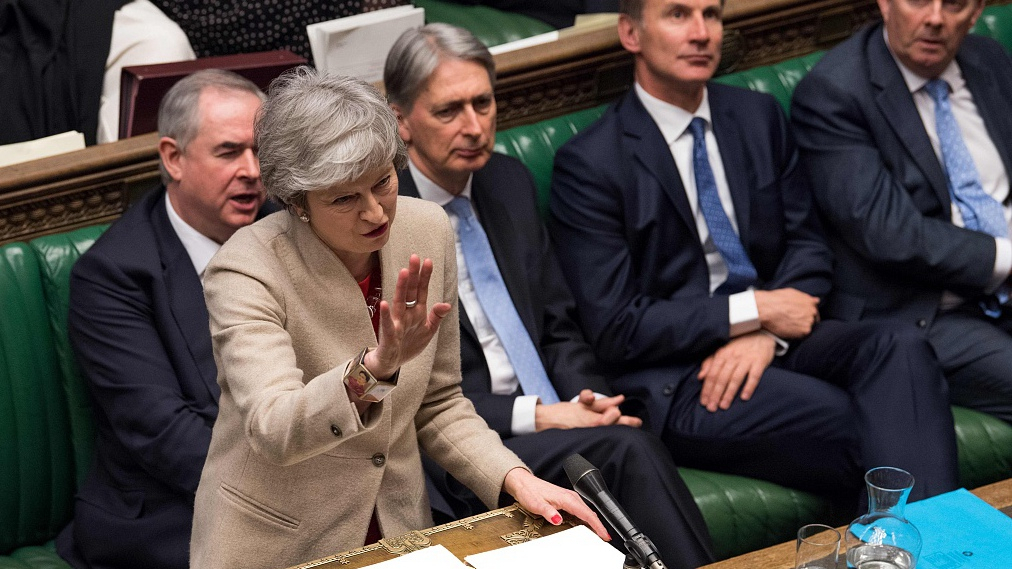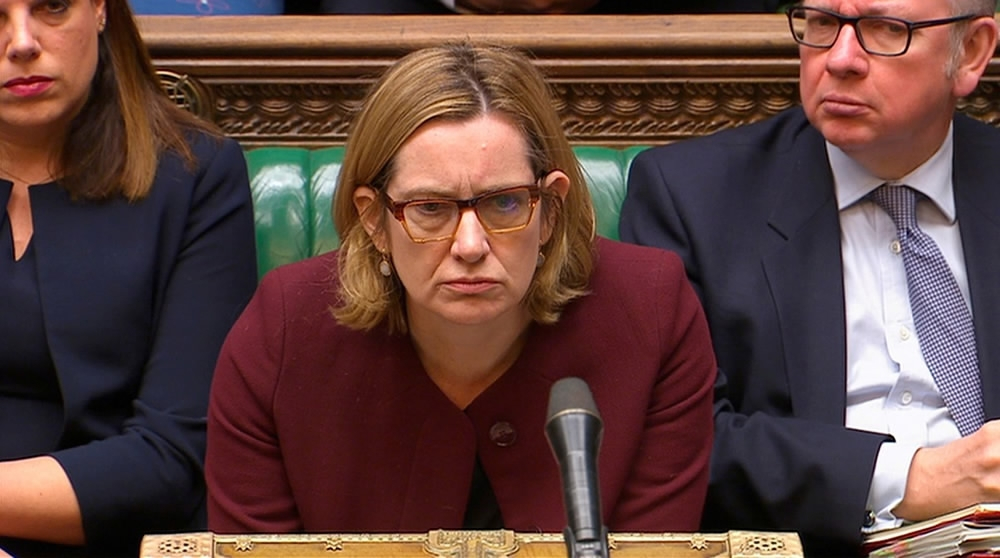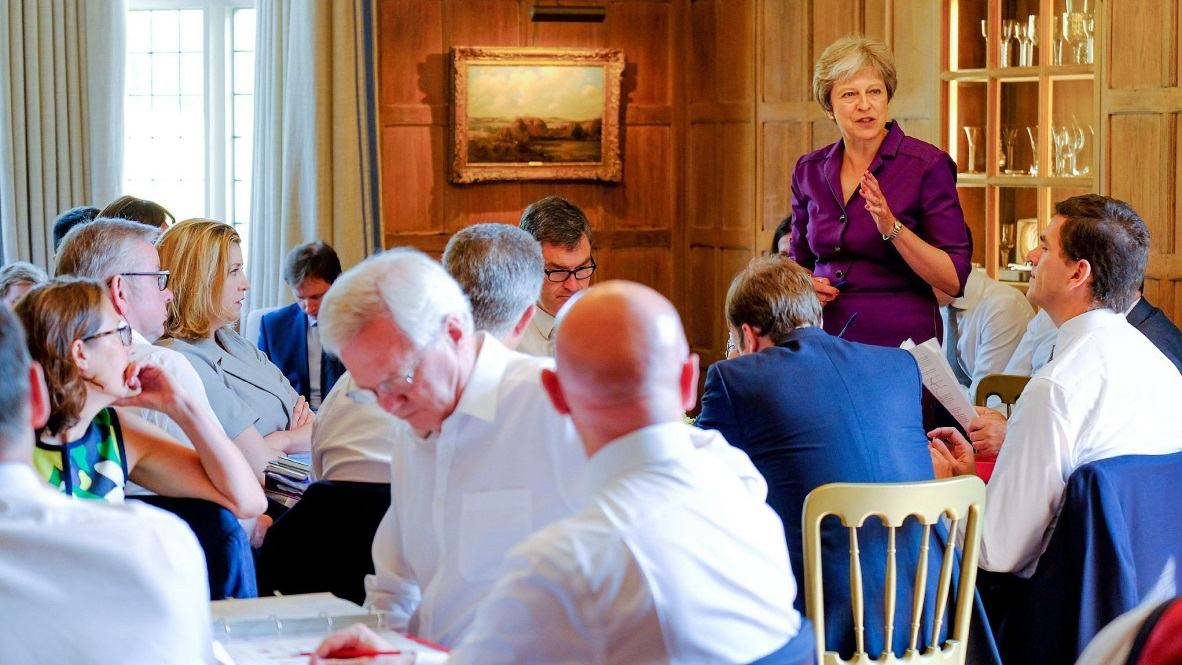
Opinion
07:39, 04-Jun-2019
Theresa May's legacy: Much promised, little delivered
Thom Brooks

Editor's note: Thom Brooks is dean of Durham Law School and professor of Law and Government at Durham University. The article reflects the author's opinion, and not necessarily the views of CGTN.
After a bruising year of repeated problems getting Parliament to pass her Brexit deal, Prime Minister Theresa May has finally relented to intense pressure and announced she will resign on Friday, June 7.
This has seen an explosion of new candidates hoping to replace her as leader of the Conservative Party and become prime minister. But it is doubtful a change at the top will do much to improve on May's inability to make progress on Brexit.
May's two decades in Parliament can be summed up as a career spent making promises that were often not delivered. Early in her role as an MP in 2002, May remarked that her Conservative Party had become seen as "the nasty party," a phrase that would continue to be used to taunt the party by its opponents.
As home secretary, May oversaw immigration policy and championed a "hostile environment" for migrants that seemed to epitomize the nastiness her party's critics opposed. This policy aimed at slashing immigration to under 100,000, in part, by improving immigration enforcement.
Instead of driving fewer people to the UK, net migration reached its highest ever levels while May was home secretary which shows how counterproductive her efforts were.

Britain's Home Secretary Amber Rudd (C) answers an urgent question on the treatment of members of the Windrush generation and their families in the House of Commons, in London, UK, April 26, 2018. /Reuters Photo
Britain's Home Secretary Amber Rudd (C) answers an urgent question on the treatment of members of the Windrush generation and their families in the House of Commons, in London, UK, April 26, 2018. /Reuters Photo
Instead of exposing previously unknown migrants living in Britain unlawfully, May's policy treated everyone as a suspected illegal resident. This led directly to the Windrush scandal where lawful residents and some citizens were wrongly threatened with deportation.
As prime minister, May promised to deliver Brexit by March 2019 which also did not happen. Like when she was home secretary, May only confided in a small band of advisers leaving the rest of the government out of the loop. This proved disastrous when she unveiled her Brexit plans to her Cabinet for only the first time this past July.
With all details agreed between the UK and EU subject to ratification, May expected others to back her if only to be shown to back Brexit. Yet working secretively she had failed to win trust from her colleagues and having listened to only a small handful of advisers she badly overlooked the negative reaction her colleagues had to her plans.
None of this might have mattered much if May had a majority in Parliament to pass her Brexit deal notwithstanding opposition from key Cabinet figures, but she lost her majority after breaking a promise to not hold a snap election during Brexit negotiations.
Throughout the career of what should be a remarkable story of Britain's second female prime minister is instead a history of making promises to the public that are not kept. Some might say that becoming prime minister after the Brexit referendum result was a poisoned chalice. Britain was badly divided, the referendum managed badly and the public was given unreasonable – and sometimes untruthful – expectations about what to expect from Brexit that no one was going to satisfy.

Theresa May speaks to members of her Cabinet about her Brexit plan at Chequers, near Aylesbury, Britain, July 26, 2018. /VCG Photo
Theresa May speaks to members of her Cabinet about her Brexit plan at Chequers, near Aylesbury, Britain, July 26, 2018. /VCG Photo
However, May has made the job of her successor even more difficult than it has been for her. Early in negotiations, May said that no deal was better than a bad deal. At the time, this was widely mocked because any deal would cause less economic disruption than a full break from the EU across all areas.
But given the lack of public confidence in politicians in Britain at present and given a history of empty promises, the idea that no deal is the best option is gaining traction with many pro-Leave supporters.
They are not the majority and all the signs are Remain would win a second vote – which is all the more reason why pro-Brexit voices do not support another referendum. However, the next prime minister won't be decided by the general public who want Remain but by a Tory Party whose fortunes rest on delivering their promise to Leave – complicated by the poorly run Brexit talks thus far.
Theresa May might have achieved little during her three years as prime minister, but her legacy – and problems for her party and the country – will live on for at least the short term.
(If you want to contribute and have specific expertise, please contact us at opinions@cgtn.com.)

SITEMAP
Copyright © 2018 CGTN. Beijing ICP prepared NO.16065310-3
Copyright © 2018 CGTN. Beijing ICP prepared NO.16065310-3